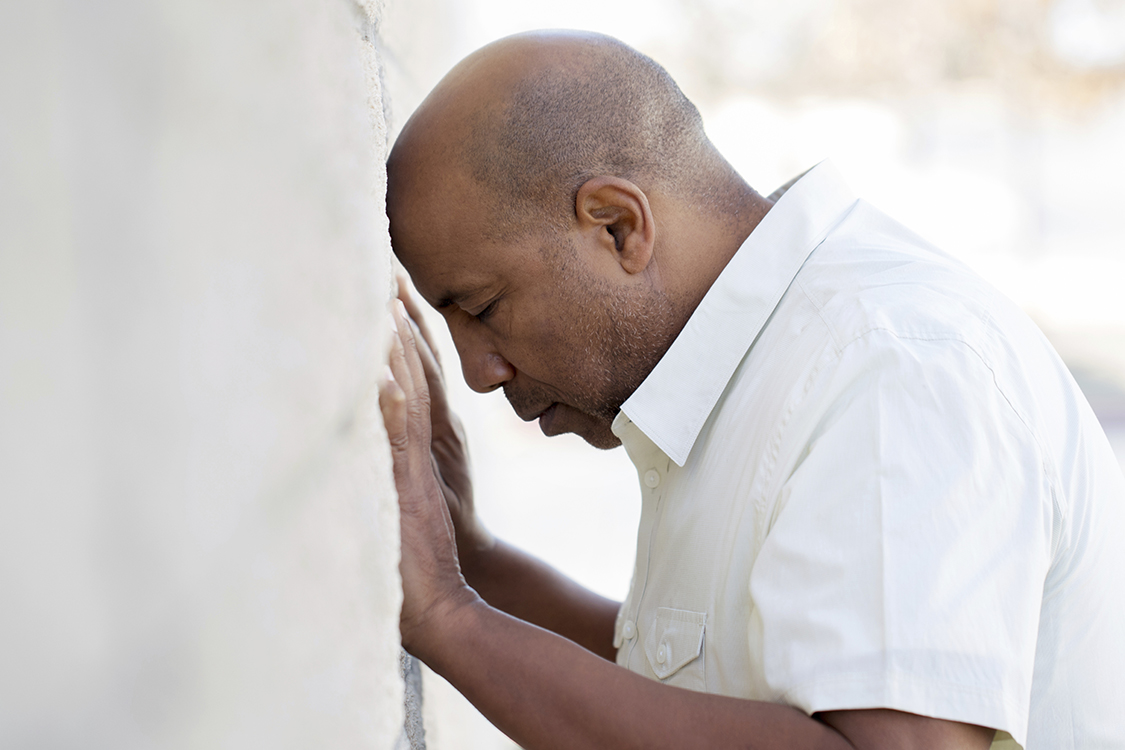
In the midst of pain, people are vulnerable and more susceptible to making choices that make their current suffering even worse. The problem is, they don’t realize this. They’re preoccupied with the immediate pain and finding relief. They are hurting, they react to the hurt, they make choices in an effort to relieve the hurt, and they can get stuck in the cycle of troubling their own troubles.
The cycle
In a search for relief, people often make reckless choices and rationalize their actions. This can lead to regret and feelings of being rejected by God (some people feel God is punishing them for their wrong choices). And the relief never comes. This article follows the story of Teri, who got caught in this cycle, and shares how to help people in your church get out of the cycle of compounding their suffering and find relief in healthy ways.
Reckless choices
Hurting people don’t see or don’t care, in that moment, that their choices may compound their suffering. After Teri’s divorce, friends warned her not to get involved with another man too soon, but Teri (a believer) did not heed their advice. She shares, “I was so lonely and I was so hurt. [This new relationship] hid all the hurt; it made me not think about what I was going through. It made me feel good that I was wanted again. I saw a lot of red flags that I really ignored. We got married, and then it seemed like all hell broke loose. It was Dr. Jekyll, Mr. Hyde.
“He was very jealous of my children. [One day] he had gotten into an argument with my grown son and we were all out in the yard. He came out with a gun and shot the gun and told my son to leave the house and never come back. The next thing out of my son’s mouth was ‘Now, Mama, do you see what we’ve been trying to tell you?’ I was just blind. It was like I didn’t care if he had problems. He was showing me love and affection, and he cared about me, and he was there for me.”
Rationalized actions
Some people who are hurting will have trouble owning up to their own sins, especially if another person’s actions caused the original suffering. They will justify, “I wouldn’t be forced to do this if she hadn’t …” Or, “I’m only giving him a taste of his own medicine; if he feels even a fraction of my hurt, that would feel good to me.” And, “What she did to me was way worse than what I’m doing now in an attempt to feel better.”
Other people use their suffering as an excuse for sin: “Of course I’m going to act this way. You don’t understand just how deeply I was hurt.” For example, Teri’s suffering was intense after her first husband had left her for another woman. She said, “I was very, very lonely. I became depressed. I started gaining a humongous amount of weight. I didn’t care if I lived or died. I met a guy and he started giving me attention, and I was like a sponge. I soaked it up. We decided to go away together for a weekend, and I didn’t think nothing of it.”
Regret and feelings of rejection by God
When a person finally realizes and admits his sin, he regrets his actions and he may even ask God for forgiveness, but since his feelings and situation don’t instantly improve, he doesn’t really know what to do at this point. This person hurts deeply, his problems are worse than before, and he figures that God is probably punishing him and he deserves it.
We asked Teri, “Do you feel that God still condemns you for your choices?” She responded with a “Yes, sir. I lost my job. I’ve been looking for two years for a full-time job and I can’t find one. I went through surgery and they almost lost me. I’ve asked for Him to forgive me, but I still feel like God’s mad at me.”
It’s important for people to realize that the amount of suffering we experience is not a measure of God’s love. Dr. Larry Crabb says,
As awful as sin is, it’s not the bottom line. The bottom line is grace, and grace only becomes real when you face what grace covers. For me to be able to look at God and say, “God, do You love me?” and He says, “Yes.”
And I say, “But did You see that?”
And He goes, “Yes, I saw that.”
“Do you still love me?”
“Yes, I really do.”
“But God, I did this yesterday, and God I’m angry, God I got these feelings, God I failed this way, did You see all that?”
A parable I heard from a friend says: “God looks at me and keeps on saying that He loves me.”1
A person caught in the cycle of reckless decisions, rationalizations, regret, and rejection is one who has not dealt with the initial pain, then adds painful consequences to his suffering. Since the person doesn’t have good coping skills, he ends up choosing bad options again.
Helping people get out of the cycle
The person in pain just wants relief. He’s tried to find relief, but his previous choices have made things worse. How do you counsel this person to find relief? How do you lead him out of the cycle of troubling his own troubles? The next section provides help for breaking a person out of the cycle.
Remind him of the gospel … while understanding the constant nature of pain
No one grieves or suffers perfectly; we make mistakes in our hurt and vulnerability. But this isn’t an excuse for sin, so we need to communicate with our people how the experience of sin in suffering can be a springboard to lasting change. Dr. Paul David Tripp provides further insight:
I look inside and I realize it’s not just grief that I’m dealing with, I’m dealing with me. I tend to be impatient. I tend to be demanding. I tend to be easily embittered, and I realize I need something more than a situational fix. I need interior remodeling, and God’s promised to do that for me.
This experience of grief is a connection of a troublesome experience and character weakness that come together. It’s always the case because you don’t get perfect people grieving. So this moment of grief, because it exposes this weakness of character, is an opportunity for real things to get fixed, and if they get fixed, I’ll carry them to all my experiences because they’re me.2
This means that confession of sin and repentance are normal parts of a person’s grieving process. But we don’t want to give a person the impression that the Bible says “repent and be free from pain.”
When ministering to a person in suffering, we must always remember the constant nature of the person’s pain. He wakes up to it, he carries it with him throughout the day, he falls asleep with it. It hovers like a spectre in his mind. Perhaps as time goes on, the pain lessens, but reminders will occur that reopen wounds. And the pain is often accompanied by temptations to find relief in unhealthy or sinful ways. Sometimes suffering people respond well. Sometimes they don’t. But when they stumble, reminding Christians that God accepts them based upon Christ’s work alone is one way to comfort them. We have to remember not to be frustrated with them, understanding their pain’s length and intensity and their ongoing temptation to relieve the pain in unhelpful ways.
Teach him what it means to worship God (Ps. 63:3–4, Job 1:20–21)
Worship brings relief. One reason is that it reminds us there is Someone who is bigger than our problems. Another reason is that it gives people the opportunity to cry out and be heard by the One who can truly do something about our pain. People often have the wrong idea of what it means to worship God. Worship doesn’t mean checking your suffering at the door and thinking “good thoughts” about God while you sing. Biblical worship involves expressing your doubts and your concerns to a God who can be counted on to hear and help. Lament is one way that we worship.
Encourage him to listen to the God of comfort (2 Cor. 1:3–5)
God has comforting words for the person who is suffering. When you counsel a person to listen to God, to His promises, to His words of comfort, it’s important that you recognize how very difficult that can be for a person who’s suffering deeply. Why people resist biblical counsel and how to help them by Jeff Forrey provides insight on why it can be hard for people to believe that God’s Word addresses their circumstances and feelings. The article also explains how to help them see that God’s Word is able to comfort them.
Provide help in community (Gal. 6:2, 1 Thess. 5:14)
When a hurting person has a safe, God-centered place to share his suffering, his questions, his fears, his vulnerabilities, that person will be strengthened in community. The value of community cannot be expressed enough. Numerous people have started on the path to healing when they first understood that “I am not alone; I’m not the only person facing this. This other person has made it through, and with God’s help and the support of other believers, I can too.” The GriefShare and DivorceCare programs provide the framework for this type of support in your church for people suffering from the pain of bereavement and the pain of divorce.
Suggest practical ways to experience comfort (1 Kings 19:1–8)
Recommendations for comfort in suffering can be actionable. You can suggest listening to solid Christian music, taking a walk by the lake, listening to sermons on your phone while driving, working in a garden, and exercising.
Dr. Paul David Tripp suggests asking the person, “What are the things in the last couple of weeks that you found to be most comforting?” Then, as the person comes up with ideas that are healthy, say, “Go there. Grab ahold of them. Find those things and thank God that He’s provided those resources for you.”3
God gives us these practical ways to experience His comfort.
Be sure to be sensitive to where a person is in his suffering when offering practical suggestions. Some suggestions are more appropriate when a person is not fresh in his grieving.
Conclusion
Suffering is a part of life, and those we minister to don’t always grieve in ways that are best or that honor God. The strategies in this article will help you keep people from compounding their suffering and getting caught in that cycle as you offer healthy alternatives for pain relief. The more people learn to keep themselves from troubling their own troubles, the easier it will be for them to handle future trials.
Footnotes:
- Church Initiative, GriefShare interview with Dr. Larry Crabb, April 2013.
- Church Initiative, GriefShare interview with Dr. Paul David Tripp, February 2006.
- Church Initiative, GriefShare interview with Dr. Paul David Tripp, September 2005.
